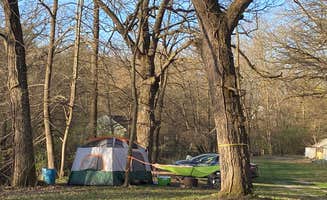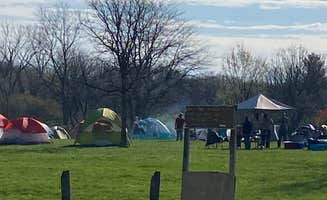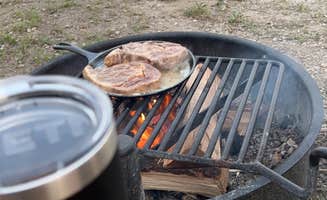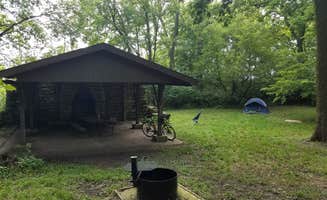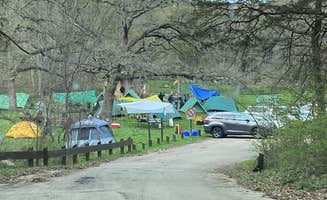Tent camping options near Sheffield, Illinois extend well beyond the Hennepin Canal sites. The area sits at approximately 600-650 feet above sea level within Bureau County's rolling prairie landscape. Winter temperatures often drop below freezing from December through February, while summer brings humidity and temperatures frequently exceeding 85°F. Seasonal flooding along river and canal areas can limit accessibility, particularly during spring months when water levels rise.
What to do
Kayaking at Plum Island: Launch from Kayak Starved Rock Campground about 30 miles east of Sheffield for paddling adventures. "We took advantage of that for some steaks. Yum. One of the best attributes of this campground is its natural beauty. It's right on the river and most all of the campsites are either river front or river view," reports Paul R.
Hiking at Castle Rock: Approximately 55 miles northeast of Sheffield, Castle Rock State Park Campground offers boat-in camping with access to unique sandstone formations. "From the launch, the canoe campground is approximately 2 miles south down river, located on the west bank. It's a beautiful and easy paddle to the sites," notes Jessica W. The return trip requires planning: "It was no joke when the other reviews said it was almost a 3 hour canoe back up to the boat launch."
Fishing at conservation areas: Waters around Sheffield provide multiple fishing spots. "Locals came in all day long to fish. Some launched their boats but most stayed on shore. We walked along the levees to explore the area," writes Art S. about Woodford State Conservation Area. Most fishing areas near Sheffield require an Illinois fishing license, available online or at local sporting goods stores for $15/day or $40/annual for residents.
What campers like
River views: Tent campers appreciate waterfront sites that showcase the region's natural beauty. "Located literally just a few stone's throw due west of the tiny town of Wyanet, which is just a few miles west of better-known Princeton, you will access this little spec of undisturbed primitive camping bliss," writes Stuart K. about Hennepin Canal Lock 21 Campground. Water access provides recreational opportunities directly from campsites.
Affordability: Budget-conscious campers value the low-cost camping options. "Fee is $8 however if you're an Illinois resident over 62 camping is free Sunday through Thursday nights," notes Jeff F. about camping at Hennepin Canal. Most primitive sites throughout the region maintain similar pricing structures, typically ranging from $8-25 per night depending on amenities.
Wildlife viewing: The quiet camping areas attract diverse wildlife. "In the morning, the river was bustling with sounds from kingfishers, herons, and flycatchers," shares Jessica W. Many campers report deer sightings near campsites, particularly at dawn and dusk when animals are most active. Bird watching opportunities peak during spring and fall migrations along the Illinois River flyway.
What you should know
Seasonal considerations: Camping near Sheffield varies dramatically by season. "The camp sites here are right between the parking lot and the fishing spots so all the fishermen and hikers go right through your site. No privacy at all," cautions Holly J. about Hennepin Canal Lock 11, highlighting the importance of site selection during busy periods. April through June typically brings higher water levels and increased insect activity.
Limited facilities: Most camping options offer minimal amenities. "The Canal's site security officer makes rounds to each campsite to collect camping fees, in-person. Campers can pay by cash or check," explains Iris A. Most canal campgrounds have vault toilets only, no running water, and inconsistent ranger presence for fee collection. Several sites lack designated fire rings, requiring campers to bring portable fire pans.
Navigation challenges: Finding smaller campgrounds requires planning. "You really have to keep your eyes peeled as the signs marking this place are low and small," warns Stuart K. about Clark's Run Campground. County roads throughout the Sheffield area often lack cellular reception, making paper maps or downloaded directions essential for reaching remote camping areas.
Tips for camping with families
Restroom access: Plan according to facility availability with children. "The Porta potties were shockingly clean! The potties also have motion sensor lights in them for at night visits. They also have wipes, spray underarm deodorant, hand sanitizer and automatic air freshener," shares Paul R. about facilities at Kayak Starved Rock Campground. Most canal sites have vault toilets spaced far apart, requiring planning for younger children.
Wildlife education: Turn animal sightings into learning opportunities. "We saw a class A, so they do fit," notes Jeff and Linda L. about motorhome access at Lock 21, where wildlife viewing includes opportunities to spot river otters, turtles, and various waterfowl. Spring months offer the best wildlife viewing with increased animal activity along waterways.
Safety considerations: Water features require supervision. "There is a porta potty, but there is no clean drinking water. Cell phone signal is not that great, but you really don't need it," shares Brian H. about Castle Rock. Most canal and river camping areas lack barriers between sites and water, requiring close supervision of children under 12 at all times.
Tips from RVers
Size restrictions: RV campers should research access limitations. "It floods out when it storms. Entry road needs repairs," cautions Jeny C. about Woodford State Conservation Area. Most primitive sites near Sheffield have limited turning radius and lack pull-through options. RVs exceeding 25 feet may have difficulty accessing many canal sites due to narrow access roads.
Water access: Plan for limited hookups when camping with an RV. "No hook-ups, just grass with a fire pit and table. Water available a couple of places along the canal," shares Jeff and Linda L. about Buffalo Rock State Park Campground. RVers should arrive with full water tanks as most sites lack reliable filling stations. Dump stations are rare, with the nearest full-service options located at private campgrounds near Princeton.
Leveling challenges: Prepare for uneven surfaces throughout the region. "The campsites are all on grassy areas with trees at the edges. This gives you some shade depending on the time of day. The grassy sites were a bit unexpected. We saw tire marks showing that people drove into the grass to set up camp," explains Art S. Most canal sites lack defined parking pads, creating potential difficulties for larger rigs requiring stabilization.


